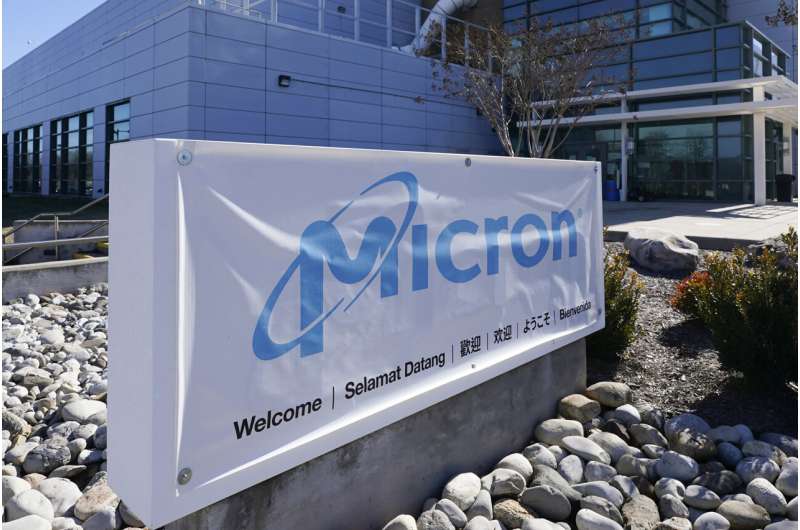Micron to bring microchip plant to upstate New York

Micron, one of the world's largest microchip manufacturers, announced Tuesday it would open a semiconductor plant in upstate New York, promising a long-term investment of up to $100 billion and a plant that could bring 50,000 jobs to the state.
The company was lured to the Syracuse area with help from a generous set of federal, state and local incentives, including up to $5.5 billion in state tax credits over 20 years.
The announcement comes after Senate Majority Leader Charles Schumer, D-NY, had pushed for Idaho-based Micron and the company's CEO, Sanjay Mehrotra, to consider upstate New York for its factory. It also comes months after Congress passed the $280 billion CHIPS and Science Act, which set aside $52 billion to bolster the semiconductor industry.
"An investment of this scale in the U.S. is simply not possible without significant government and community support," Mehrotra said at the announcement.
In addition to tax credits tied to investment and job creation, New York has pledged $200 million for road and infrastructure improvements where the plant is being built in suburban Clay and $100 million to a "community benefit" fund. The state also will review supplying the operation with low-cost power.
New York has a long history of providing financial incentives for companies to locate or expand in the state, with critics questioning whether taxpayers consistently get their money's worth. Recently, Democratic Gov. Kathy Hochul has defended her plan to spend an eventual $850 million in taxpayer money toward a new stadium for her hometown Buffalo Bills.
Companies like Micron manufacture the diminutive chips that power everything from smartphones to computers to automobiles. The federal bill was aimed at bolstering U.S. competitiveness against China and avoiding another chip shortage like the one that derailed the automobile and technology industries during the pandemic.
"Chips are essential to our economy, and if we were to lose the ability to manufacture chips here in the United States, it would be a severe, both economic security and national security risk," Schumer said in an interview with The Associated Press. "This will be the most advanced memory chip manufacturing facility in the United States and probably the world. And it's located in a place that will really benefit from it."

The company plans to invest up to $100 billion over the next 20-plus years to construct the project, with the first investment of $20 billion planned by the end of the decade. The deal is also expected to bring more than 9,000 jobs to Micron, and officials believe it could also bring close to 40,000 other ancillary jobs to the region, from suppliers to contractors, officials said.
After signing the $280 billion bill last month, President Joe Biden touted the New York investment as proof that it was working.
"Today is another win for America, and another massive new investment in America spurred by my economic plan," Biden said. "Micron, an American company, is investing $20 billion dollars this decade and up to $100 billion over twenty years in CHIPS manufacturing in upstate New York, creating tens of thousands of good-paying jobs. Together, we are building an economy from the bottom up and the middle out, where we lower costs for our families and make it right here in America."
Micron, based in Boise, Idaho, has several chip manufacturing plants around the world, including in Singapore and Taiwan. The company announced in September that it would invest $15 billion though the end of the decade on a new semiconductor plant in its hometown, which the chipmaker said will create 17,000 American jobs.
Manish Bhatia, Micron's executive vice president of global operations, told the AP that New York was selected in large part because it has a history of semiconductor development. New York is currently home to 76 semiconductor companies, according to Schumer.
"There is an ecosystem of other manufacturers, research institutions," Bhatia said. "We believe we can funnel a lot of that talent" to the Syracuse-area, including military veterans.
Bhatia also said the company needed a large site for a facility that could ultimately encompass 2.4 million square feet. That also means having the water and power infrastructure in place to accommodate the production of memory chips, a sector that he said is growing because the "era of big data" requires even more capacity for processing larger and larger sets of information.
"This is like a 21st century Erie Canal," Schumer said of the New York plant. "And just as the original Erie Canal did centuries ago, this will help cement the growth of our economy for decades to come, not only in upstate New York, but in the country, since these chips are so vital to so many of our cutting-edge industries."
© 2022 The Associated Press. All rights reserved. This material may not be published, broadcast, rewritten or redistributed without permission.



















